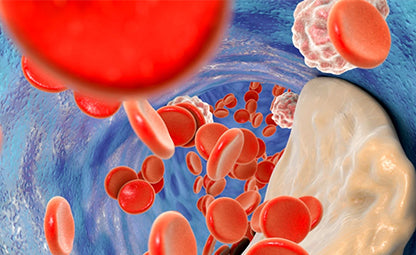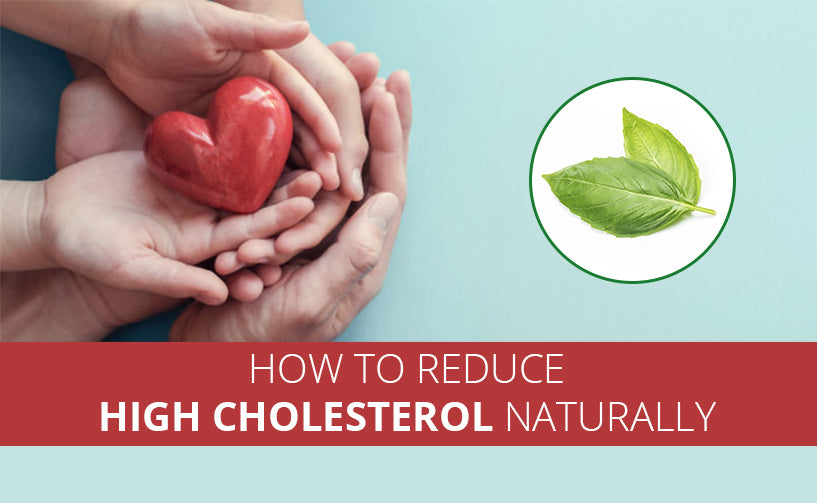What is Cholesterol?
Cholesterol is a type of lipid- a waxy, fat-like substance that the liver produces naturally. It is vital for the formation of cell membranes, certain hormones, and vitamin D, essential for the body. Cholesterol also plays an important role in the body’s ability to build healthy cells and in maintaining flexible cell walls; and without it, the body simply cannot function efficiently. Additionally, animal-based foods like meat, poultry and dairy products that are high in saturated and trans-fats also contribute to cholesterol formation in the body. These fats cause the liver to produce more cholesterol than it otherwise would which, for some people, this added production means a switch from normal cholesterol level to one that is unhealthy.
Like fat, cholesterol does not dissolve in water, so it is unable to travel through the blood on its own. So, to help transport cholesterol, the liver produces molecules called lipoproteins (particles made from fat and protein) to help carry cholesterol, fat and triglycerides (another type of lipid) through the bloodstream. There are two major forms of lipoprotein namely, low-density lipoprotein (LDL) and high-density lipoprotein (HDL).

What are LDL and HDL?
Not all cholesterol is the same and different kinds of lipoproteins have different effects on health. High levels of low-density lipoprotein (LDL) can be harmful to the health as it can result in cholesterol deposits in blood vessel walls, which can lead to clogged arteries (atherosclerosis), vascular issues and kidney failure. Hence, LDL is known to be the ‘bad cholesterol’. On the other hand, high-density lipoprotein (HDL) helps remove the bad cholesterol from the bloodstream and helps prevent diseases. Therefore, HDL is known to be the ‘good cholesterol’.
If you have high cholesterol levels, it usually means you have too much LDL and not enough HDL. Having "high cholesterol" may not have symptoms, but it can increase the risk of heart disease and stroke. Over the counter drugs may not always the best answer on how to reduce high cholesterol levels, as these medications are limiting and often come with side effects, such as headaches, muscle cramps, and nausea.
Effective Home Remedies on How to Reduce High Cholesterol
There are certain changes you can make in your diet and life in general, to help lower your LDL and increase your HDL without the need for harmful medications. Here are some of the effective home remedies on how to reduce high cholesterol:
1. Turmeric
Turmeric has been a staple kitchen ingredient in Indian households and has been utilized as a healing medicine in Ayurveda for ages. The Curcumin in turmeric helps in breaking down the plaque coating or cholesterol deposits on the walls of the blood vessels. Include turmeric in your curries and teas or add some turmeric in a glass of milk before sleep to help reduce bad cholesterol.
The best way to consume turmeric is to have half a teaspoon of turmeric with warm water in the morning before breakfast. Immune Boosting Tea by Preserva Wellness packs all the richness of turmeric and other natural herbs to help manage cholesterol and boost immunity. It is nutritious and tasty, perfect for a morning tea-time.
2. Garlic
A common kitchen ingredient like turmeric, garlic has also been known for its health-enhancing properties. Garlic is a rich source of amino acids, vitamins, minerals, and high concentration of organosulphur compounds like allicin, ajoene, and diallyl sulfide. These compounds are known for giving garlic its therapeutic properties and for reducing total and LDL cholesterol significantly. Some scientific studies have also shown that garlic has a positive effect on the blood pressure and the antioxidant potential of blood.
Studies have also shown that consuming 1/2 to 1 garlic clove regularly in the morning and at bedtime could reduce cholesterol level by up to 9%. Raw garlic works better than cooked ones.
3. Green Tea
One can never go wrong with drinking herbal teas especially if it is a brew of green tea. Green tea offers an ideal solution on how to reduce high cholesterol the natural and easy way. It is a rich source of polyphenol compounds which provide immense health benefits to the human body. The high concentration of these compounds not only lowers LDL Cholesterol levels but also increases HDL Cholesterol
A study also found that people who drink green tea have lower cholesterol levels as compared to those who don't. Studies have also shown that polyphenols of tea may block cholesterol absorption in intestines and help get rid of it. A daily dose of green tea-enriched Daily Detox Tea will help reduce the chances of fatty liver formation and help control cholesterol.
4. Amla
One of the richest sources of antioxidants, Amla has been used in Ayurveda as a rasayan in treating various diseases for centuries. It is also rich in Vitamin C, phenolic compounds, minerals and essential amino acids which are great for lowering the cholesterol levels. Daily consumption of Amla not only reduces bad cholesterol levels but also reduces the damage due to oxidation.
Consume fresh Amla fruit or drink a glass of lukewarm water with 1 teaspoon of dried Amla once a day for optimal advantage. Natural supplements like Diabewell Juice contains the healing power of Amla along with pure Ayurvedic ingredients to help lower high cholesterol and manage diabetes.

5. Coriander Seeds
Coriander or Dhaniya seeds have been used in Ayurveda for many ailments. This humble spice is loaded with high levels of antioxidants that help lower bad cholesterol. Apart from lending appetizing aroma to the dish, coriander seeds are rich in folic acid, vitamin C, vitamin A and beta-carotene that are potent agents in reducing LDL cholesterol levels.
Boil one tsp. of coriander seeds in water for about two minutes, and then strain and drink it. This remedy helps in keeping cholesterol levels under check.
6. Soluble Fibre
Foods like orange, pear, peach, potato, whole wheat bread, oatmeal, kidney beans are rich sources of soluble fibres that help improves digestion and lowers the LDL cholesterol levels and improves overall heart health. Soluble fibre dissolves into a gel-like substance in the digestive tract and helps the lowering of cholesterol absorption in the bloodstream.
Soluble fibre lowers LDL cholesterol levels but does not affect HDL cholesterol or triglyceride levels. Consuming too much soluble fibre can lead to constipation, bloating, and stomach pain.
Lifestyle Changes for Low Cholesterol
Besides genetics, certain medical conditions, and medications, unhealthy lifestyle choices like smoking, unhealthy diet, sedentary lifestyle, etc. are the leading cause of high cholesterol. Adopting healthy lifestyle habits by avoiding trans unsaturated fats in your foods, maintaining a healthy weight, incorporating physical activities and exercising regularly, cutting down on alcohol consumption, reducing stress, and laughing more can come a long way in managing blood cholesterol levels and in promoting positive overall health that has lasting effects.
Preserva Wellness brings together the safest and most effective way on how to reduce high cholesterol naturally and improve the overall health simultaneously. Adhered to Ayurveda, Preserva products are all-natural with no harmful side effects, unlike conventional drugs that can do more harms than helping it.






